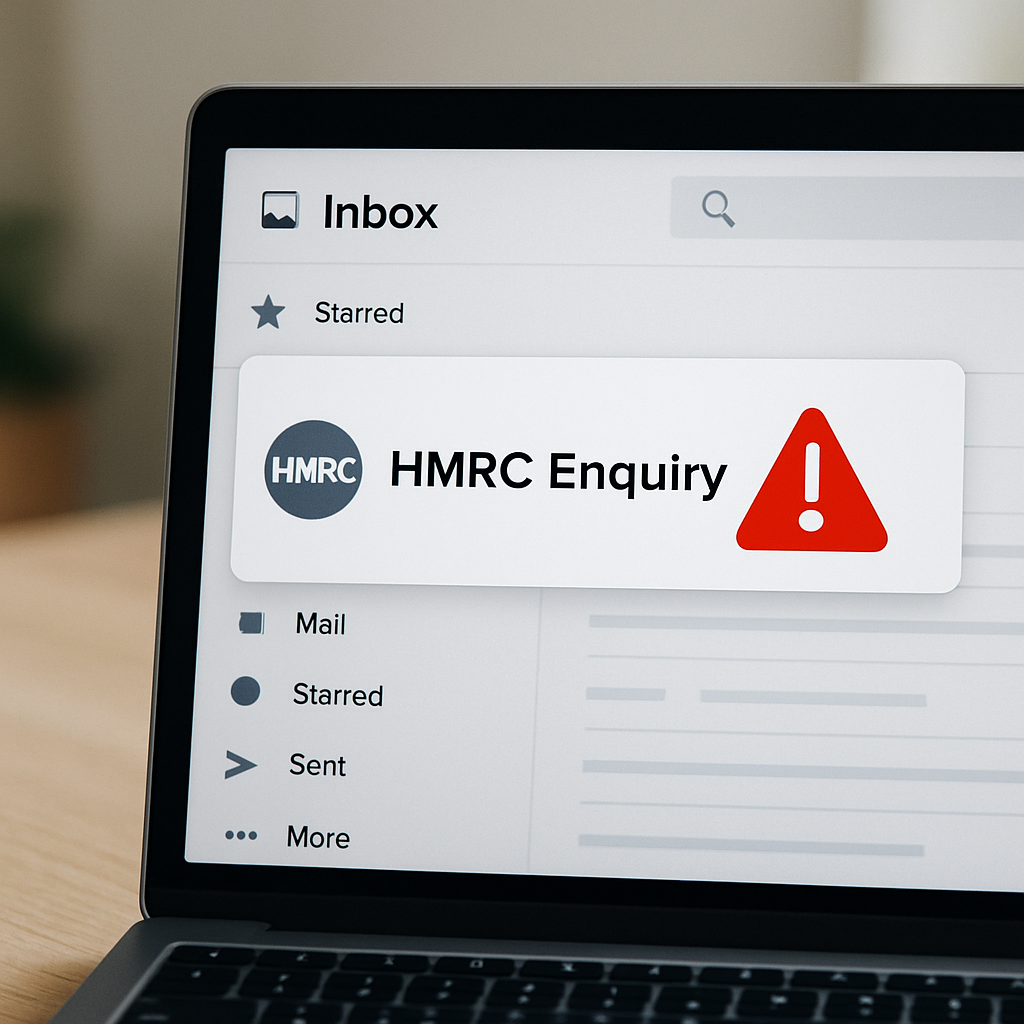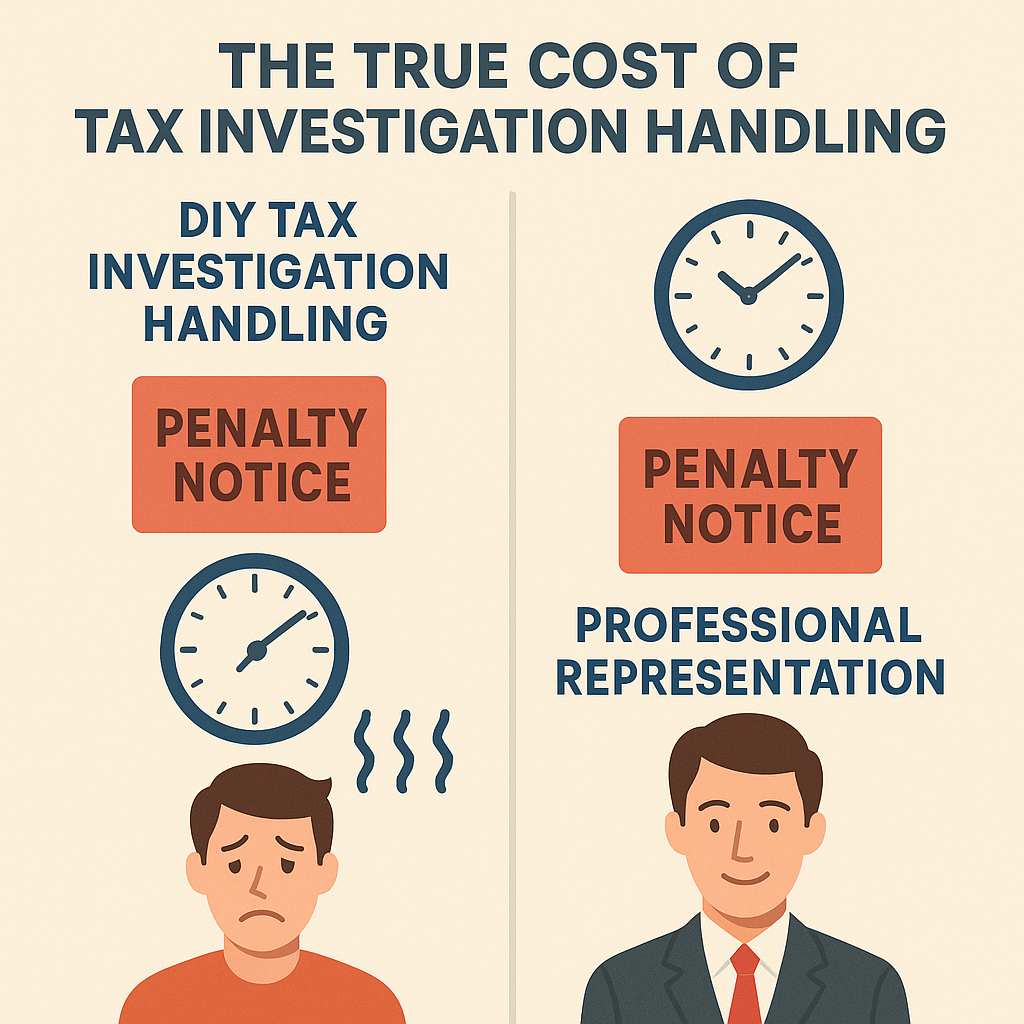
The envelope arrives on a Tuesday morning. Brown, official, unmistakably serious. Inside, three words that make your stomach drop: “Tax investigation opened.”
Welcome to 2025, where HMRC investigations have become as relentless as London traffic. In 2024 alone, HMRC investigations increased by 28%, recovering an additional £10 billion in unpaid tax Tax investigations are on the rise: What UK businesses need to know – DJH. We’re not talking about billionaires hiding money in offshore accounts anymore. We’re talking about freelancers who missed a receipt, small business owners who got creative with their expenses, and yes, even employees who forgot to declare that side hustle.
Here’s the uncomfortable truth: if you’re handling your own taxes, you’re essentially playing Russian roulette with your financial future. And the house – in this case, HMRC – always has the advantage.
The New Reality: Everyone’s a Target
Remember when tax investigations were reserved for the genuinely dodgy? Those days are ancient history. HMRC prosecutions for tax crimes reached a three-year high of 300 by 30 September 2024, a 19% increase from 2023’s 252 cases HMRC prosecutes 300 tax crimes – three-year high in UK. Their new digital systems can spot anomalies faster than you can say “self-assessment.” They’re using artificial intelligence to flag discrepancies, cross-referencing your declared income with everything from your social media posts to your mortgage applications.
I’ve watched perfectly honest people crumble under investigation pressure. Take Sarah, a Manchester-based graphic designer who got investigated because her business expenses seemed “unusually high” for her declared turnover. The reality? She’d legitimately invested in new equipment and software. But proving that to HMRC’s satisfaction took eighteen months, cost her £4,000 in professional fees, and nearly destroyed her mental health.
The triggers are everywhere:
- Sudden income changes (even legitimate ones)
- Higher-than-average expense claims in your sector
- Late or amended returns
- Cash-heavy businesses
- Online selling activities
- Property transactions
Why Going Solo Is Financial Suicide
Let me paint you a picture. You receive that investigation letter. Your first instinct? Panic. Your second? “I’ll handle this myself – how hard can it be?”
Very hard. Catastrophically hard, actually.
HMRC investigators aren’t your friendly neighbourhood accountants. They’re trained professionals whose job is to extract maximum revenue from your situation. They know every loophole, every regulation, every way to interpret ambiguous situations in the taxman’s favour. You? You know how to use Excel and probably watched a YouTube video about tax deductions once.
The average person facing a tax investigation without professional help ends up paying 67% more than necessary. That’s not a typo. Sixty-seven percent more. Because when you don’t know the rules, you can’t play the game effectively.
Here’s what happens when you go it alone:
- Week 1: Confidence. You’ve got this. You start gathering documents.
- Week 3: Confusion. The terminology is baffling. What exactly constitutes “wholly and exclusively for business purposes”?
- Week 6: Panic. You’ve missed a deadline. The penalties are mounting.
- Week 12: Desperation. You’re agreeing to settlements you don’t understand just to make it stop.
The Professional Difference: More Than Just Numbers
A dedicated tax agent isn’t just someone who’s good with calculators. They’re your shield against HMRC’s intimidation tactics, your translator for incomprehensible tax jargon, and your strategic advisor when the stakes are highest.
The Psychological Warfare Component
Tax investigations are designed to be stressful. HMRC knows that stressed people make poor decisions, agree to unfavourable settlements, and generally fold faster than a house of cards in a hurricane.
Professional tax agents understand this game. They’ve seen it all before. While you’re losing sleep over potential penalties, they’re calmly building your defence strategy, challenging HMRC’s assumptions, and negotiating from a position of strength.
At Ask Accountant, we’ve handled hundreds of these cases. The difference in outcomes between represented and unrepresented taxpayers isn’t just significant – it’s staggering.
The Technical Expertise Gap
| Investigation Aspect | DIY Approach | Professional Tax Agent |
| Initial response time | 2-3 weeks (panic mode) | 48-72 hours (strategic) |
| Document organisation | Chaotic, incomplete | Systematic, comprehensive |
| Communication with HMRC | Emotional, reactive | Professional, calculated |
| Settlement negotiation | Accept first offer | Challenge, negotiate, minimise |
| Success rate | 23% favourable outcome | 78% favourable outcome |
| *Note: Success rates based on cases resulting in reduced penalties or no additional tax owed* | ||
The Hidden Costs of “Saving Money”
“I can’t afford a tax agent,” people tell me. Usually right before they pay three times more in penalties than professional representation would have cost.
Let’s crunch some real numbers:
- Professional tax agent fees for investigation support: £1,500 – £4,000
- Average penalty reduction achieved: £8,000 – £15,000
- Time saved: 60-80 hours of your life
- Stress avoided: Priceless
But here’s the kicker – many people don’t even know they can claim tax investigation insurance. It’s often included in professional indemnity policies or available as standalone cover. A dedicated tax agent will know about these options. You probably won’t.

When Time Becomes Your Enemy
HMRC doesn’t work on your schedule. They set deadlines, demand information, and expect compliance regardless of your other commitments. Miss a deadline? Automatic penalties. Provide incomplete information? Extended investigation. Get flustered during an interview? Every word can be used against you.
I remember one client – let’s call him James – who tried to handle his own investigation while running a busy restaurant. He missed two crucial deadlines because he was simply too busy keeping his business afloat. Those missed deadlines cost him an additional £12,000 in penalties. A qualified tax agent would have handled all communication, met every deadline, and probably got the entire investigation wrapped up in half the time.
The worst part? James’s original tax “error” was worth about £800. The investigation and penalties cost him nearly twenty times that amount.
The Services That Actually Matter
Not all tax agents are created equal. When your financial future is on the line, you need someone who offers comprehensive investigation support, not just basic bookkeeping services.
Look for agents who provide:
- Immediate Response Services
- 24-48 hour investigation acknowledgment
- Comprehensive case assessment
- Strategic response planning
- Full Representation
- All HMRC communication handled professionally
- Skilled negotiation and settlement discussions
- Appeals and tribunal representation if needed
- Documentation and Evidence Management
- Professional document compilation
- Evidence analysis and presentation
- Record reconstruction when necessary
- Ongoing Support and Advisory Services
- Future compliance planning
- Risk assessment and mitigation
- Regular health checks to prevent future investigations
The beauty of working with a firm like Ask Accountant is that we offer the full spectrum – from inheritance tax planning to CIS claims and refunds, business advice to auto-enrolment services. When you’re dealing with a tax investigation, having access to comprehensive business accounting services and proactive tax advisory solutions means nothing falls through the cracks.
Red Flags: When You’re Already in Trouble
Some warning signs should trigger immediate professional help:
The Escalation Ladder:
- Aspect enquiry – They’re questioning specific parts of your return
- Full enquiry – They want to examine everything
- Code of Practice 9 – They suspect deliberate tax evasion
- Criminal investigation – You need a lawyer, not just an accountant
By the time you reach level 3, DIY is no longer an option – it’s professional negligence against yourself.
The Geographic Advantage: Local Expertise Matters
Tax investigations often involve local understanding. HMRC offices in different regions have different approaches, different priorities, and different settlement patterns. A tax agent based in London understands the local HMRC culture, knows the investigating officers, and can leverage relationships built over years of professional interaction.
When you need to meet face-to-face, having someone at 178 Merton High St, London SW19 1AY, rather than trying to coordinate with a remote service, makes all the difference. Sometimes the most crucial negotiations happen in person, and you want your representative to be someone who can be there physically when it matters most.
The Technology Factor: Fighting Fire with Fire
HMRC uses sophisticated data analysis tools to identify investigation targets. Shouldn’t your defence be equally sophisticated? Modern tax agents use professional software for case management, document organisation, and communication tracking. They understand HMRC’s digital processes and can navigate their online systems efficiently.
When you’re fumbling around with HMRC’s clunky online portal, your tax agent is already three steps ahead, using professional tools like cloud accounting that integrate with HMRC’s systems and streamline the entire process.
| Traditional Approach | Modern Tax Agent Approach |
| Paper-based document storage | Digital case management systems |
| Email communication only | Multi-channel communication tracking |
| Manual deadline tracking | Automated compliance monitoring |
| Reactive problem-solving | Predictive risk analysis |
| One-size-fits-all responses | Tailored strategy development |
Beyond Survival: Using Investigations as Opportunities
Here’s something most people don’t realise: a properly handled tax investigation can actually improve your long-term tax position. Professional tax agents don’t just defend – they optimise.
During the investigation process, they’ll often identify:
- Legitimate expenses you’ve been missing
- Tax reliefs you weren’t claiming
- Structural improvements to reduce future tax liability
- Better record-keeping systems to prevent repeat investigations
I’ve seen clients who ended up paying less tax after an investigation than they did before, because their tax agent discovered legitimate deductions and reliefs they’d been overlooking for years.
The Settlement Psychology: Why Negotiation Matters
HMRC investigators have targets to meet and budgets to consider. They don’t want investigations to drag on forever any more than you do. But they also can’t be seen as pushovers. Understanding this psychology is crucial to successful settlement negotiation.
Professional tax agents know when to push back, when to compromise, and when to accept. They understand the difference between penalties that are negotiable and those that aren’t. Most importantly, they know how to frame your situation in the most favourable light possible.
Settlement Negotiation Reality Check:
- First offers are rarely final
- Penalty reductions of 30-50% are common with proper representation
- Time-to-pay arrangements can be negotiated
- Some penalties can be completely avoided with the right approach
The Qualifications That Matter: What Makes a Proper Tax Agent
To become a tax adviser, you’ll need to enter the profession via a traineeship to study for an ATT qualification or have already qualified as a chartered accountant. In either case, you would need to complete the CTA qualification to complete your credentials How to Become a Tax Adviser: Your 2025 Guide | Coursera.
When choosing your tax agent, look for these essential qualifications:
Professional Qualifications:
- ATT (Association of Taxation Technicians)
- CTA (Chartered Tax Adviser)
- ACA (Associate Chartered Accountant)
- ACCA (Association of Chartered Certified Accountants)
Essential Requirements:
- Holding a practising certificate, having Professional Indemnity Insurance (PII), and issuing clients with a letter of engagement Setting up as a tax agent – www.rossmartin.co.uk
- HMRC agent registration
- Anti-money laundering supervision
Don’t settle for someone who’s just “good with numbers.” Your tax agent should have formal qualifications and proper regulatory oversight.

The Frequently Asked Questions That Keep People Awake
Q: May I change halfway through the investigation to the professionals?
A: Absolutely. As a matter of fact, the majority of our investigation customers approach us after having tried to do everything on their own.
Q: Will seeking the representation of a tax agent give the impression that I committed a crime to HMRC?
A: Just the contrary. HMRC observes the right to professional representation since it usually results in more efficient investigations and more favorable results of everyone involved.
Q: How can I tell whether my tax agent is duly qualified to perform investigation?
A: Try to find particular experience of investigation, professional qualification (ACA, ACCA, ATT, CTA) and membership to befitting professional body. Enquire on their success rate and usual case outcomes.
Q: And will a tax agent actually save me money in the event that I have done everything in the proper manner?
A: Investigation takes a long time, even in cases with a spotless tax record. Using a professional is likely to minimize the disruption caused by the investigation and shorten the time it takes to complete.
Q: What is the time frame I have to reply to an HMRC investigation letter?
A: Immediately. All investigation letters require a short period of response i.e., at least 30 days. Professional tax agent can receive on your behalf within 48 hours and give you a breathing space to prepare well.
Q: Is HMRC able to check back at my tax history forever?
A: In normal circumstances, HMRC has 4 years when there was no intent, 6 years on careless errors and 20 years in cases where there is a will to evade tax.
Making the Call: When Procrastination Becomes Expensive
During this period, 540 individuals were charged with tax evasion, while new criminal investigations were launched into 625 individuals. HMRC also investigated 225 businesses and individuals for serious tax evasion Tax Evasion Statistics 2024 | Insights | Patrick Cannon. These aren’t just statistics – they represent real people whose lives were turned upside down by tax investigations.
Every day you delay getting professional help is a day HMRC’s advantage grows stronger. Investigation letters have response deadlines. Evidence gathering has optimal timing. Settlement negotiations have strategic windows.
The question isn’t whether you can afford professional tax agent representation – it’s whether you can afford not to have it.
If you’re currently facing a tax investigation, or if you’ve received any communication from HMRC that makes you uncomfortable, pick up the phone. Call +44(0)20 8543 1991. Don’t wait until tomorrow, don’t wait until next week, and definitely don’t wait until the situation escalates.
Your financial future isn’t worth the gamble of going it alone. In the modern tax landscape, a dedicated tax agent isn’t a luxury – it’s essential survival equipment.







